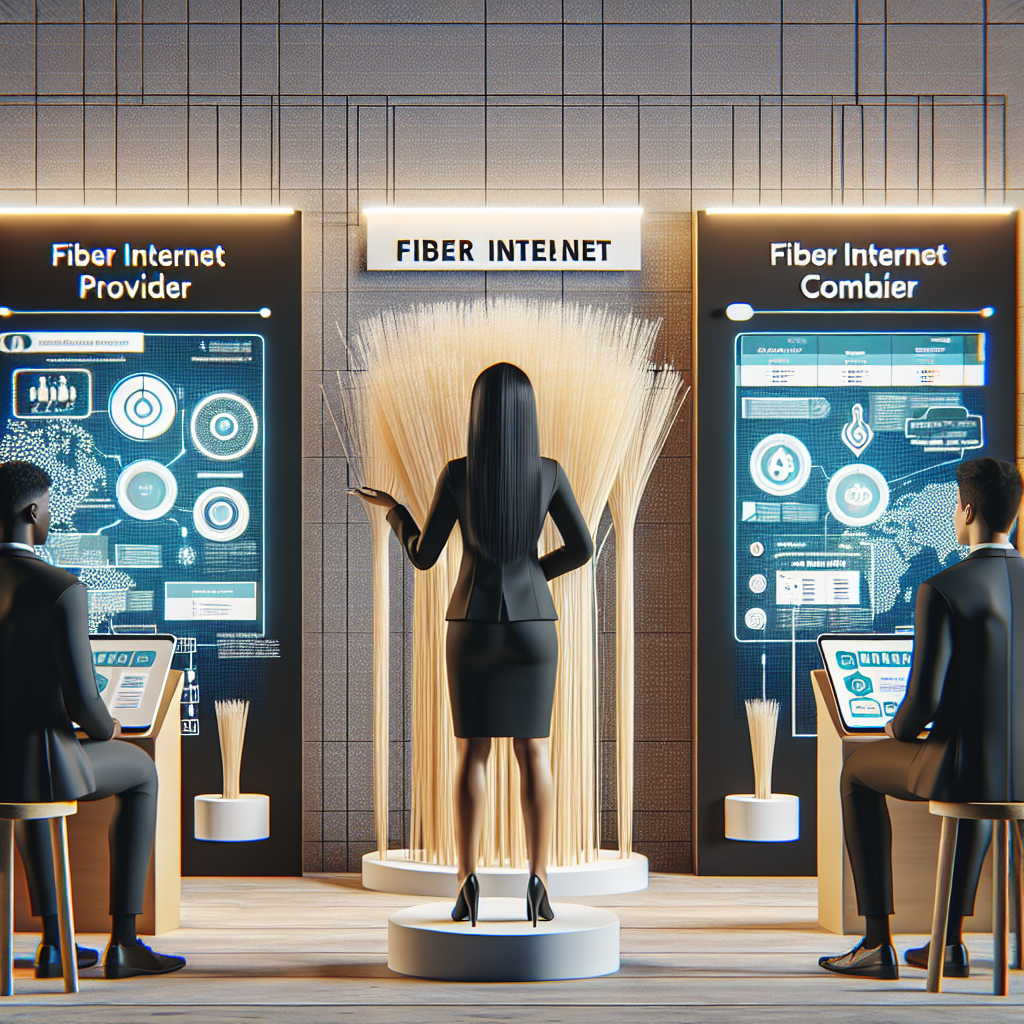In today’s digital age, having fast and reliable internet is a necessity. And when it comes to speed and performance, fiber internet is the way to go. But with so many providers out there, how do you know which one to choose? In this article, we will compare the top fiber internet providers in the market, analyzing their speeds, prices, and customer service. Whether you’re a gamer looking for lightning-fast speeds or a remote worker needing a reliable connection, we will help you navigate the options and find the best fit for your needs. So, sit back and let us guide you through the world of fiber internet providers.
When comparing fiber internet providers, it is important to consider factors such as speed, reliability, and pricing. Look for providers that offer the fastest speeds within your budget and have a reputation for reliable service. Additionally, consider any special offers or promotions that may be available. Ultimately, the best provider for you will depend on your specific needs and preferences, so be sure to research and compare options before making a decision.
Understanding Fiber Internet Services

What is Fiber Internet?
Understanding Fiber Internet Services
Definition of Fiber Internet:
Fiber internet, also known as fiber-optic internet, is a type of broadband connection that utilizes fiber-optic cables to transmit data at incredibly high speeds. These cables are made of thin strands of glass or plastic that carry digital information using pulses of light.
How Fiber Internet Works:
– Fiber internet works by sending data as pulses of light through the fiber-optic cables.
– These pulses travel at speeds close to the speed of light, resulting in significantly faster internet connections compared to traditional copper wire connections.
– The data is transmitted in binary code, which is a series of ones and zeros that represent different types of information.
– Fiber internet is considered more reliable and efficient than other types of internet connections due to its ability to maintain high speeds over long distances without interference or signal degradation.
Benefits of Fiber Internet
- Speed and Reliability
Fiber internet providers offer unparalleled speed and reliability compared to traditional broadband services. With fiber-optic cables transmitting data using light signals, users can enjoy incredibly fast download and upload speeds. This high-speed connectivity ensures seamless streaming, gaming, video conferencing, and large file transfers without interruptions or buffering. Additionally, fiber internet is less susceptible to interference, providing a more stable and reliable connection for users.
- Bandwidth Capacity
One of the key advantages of fiber internet is its impressive bandwidth capacity. Fiber-optic cables can support a much greater amount of data compared to traditional copper cables, allowing for multiple users to simultaneously stream high-definition content, engage in online gaming, and conduct video conferences without experiencing slowdowns or latency issues. This increased bandwidth capacity is particularly beneficial for households or businesses with multiple connected devices that require high-speed internet access.
- Low Latency
Fiber internet providers offer low latency, which refers to the delay between sending and receiving data packets. The minimal latency provided by fiber-optic connections ensures swift and responsive internet performance, making it ideal for online activities that demand real-time interaction, such as online gaming, video calls, and live streaming. This low latency can significantly enhance the overall user experience by reducing delays and improving the responsiveness of internet applications and services.

Key Factors to Consider When Comparing Providers
Coverage Area
When comparing fiber internet providers, one of the key factors to consider is the Coverage Area. The availability of fiber optic networks varies significantly from one provider to another, making it crucial to assess the coverage area before making a decision.
Importance of Coverage Area
The importance of Coverage Area cannot be overstated when selecting a fiber internet provider. A provider may offer lightning-fast speeds and reliable connections, but if their services are not available in your area, it becomes irrelevant. Opting for a provider with extensive coverage ensures that you can access high-speed internet without limitations.
Checking Availability in Your Area
Before choosing a fiber internet provider, checking availability in your area is essential. Most providers have online tools or customer service representatives who can verify if their services are accessible at your location. Conducting this simple check can save you from the frustration of signing up for a provider only to realize that they do not serve your area.
Speed Options
When comparing fiber internet providers, one of the key factors to consider is the speed options they offer. Here are some important details to keep in mind:
-
Understanding Speed Tiers: Fiber internet providers typically offer a range of speed tiers to choose from. These tiers are usually categorized based on the download and upload speeds they provide. For example, you may come across options like 100 Mbps, 500 Mbps, or even 1 Gbps. It’s essential to understand what each speed tier means in terms of actual internet performance.
-
Matching Speed to Your Needs: To determine which speed tier is right for you, consider your internet usage habits. If you primarily use the internet for basic tasks like browsing the web and checking emails, a lower speed tier may suffice. However, if you frequently stream high-definition content, engage in online gaming, or work from home, you may benefit from a higher speed tier to ensure a smooth and reliable connection.
By carefully assessing your internet usage requirements and comparing the speed options offered by different fiber internet providers, you can choose a plan that best suits your needs.
Pricing and Plans
When comparing fiber internet providers, one of the key factors to consider is their pricing and plans. Here are some details to keep in mind:
-
Monthly Costs: The monthly cost of a fiber internet plan can vary significantly between providers. It’s essential to compare the base price for the internet service to ensure you’re getting the best value for your money. Additionally, some providers may offer promotional pricing for the first few months, so be sure to factor in any potential price increases once the promotional period ends.
-
Additional Fees: In addition to the monthly cost of the internet service, providers may charge additional fees that can impact the overall affordability of the plan. These fees may include installation fees, equipment rental fees, or fees for exceeding data usage limits. Be sure to inquire about any potential additional fees when comparing providers.

– Contract Terms: Another crucial aspect to consider when comparing fiber internet providers is the contract terms they offer. Some providers may require you to sign a long-term contract, typically ranging from 12 to 24 months, while others may offer month-to-month plans without a contract. Consider your flexibility needs and any early termination fees associated with the contract before making a decision.
Comparing Top Fiber Internet Providers in the USA
Provider 1:
Overview
Provider 1 is a leading fiber internet service provider in the USA known for its reliable and high-speed connections. They offer cutting-edge fiber optic technology to deliver fast and stable internet to their customers.
Coverage Area
Provider 1 has a widespread coverage area across major cities and suburban regions in the country. Their network infrastructure is continuously expanding to reach more customers and provide them with top-notch internet services.
Speed Options
Customers can choose from a range of speed options offered by Provider 1, starting from basic plans suitable for everyday use to ultra-high-speed plans for heavy internet users and businesses. The speeds are consistently fast and ensure smooth online activities.
Pricing
Provider 1 offers competitive pricing for their fiber internet plans, making it accessible to a wide range of customers. They have various packages available to cater to different budgets and needs, ensuring that customers can find a plan that fits their requirements without breaking the bank.
Provider 2:
-
Overview
Provider 2 is a leading fiber internet provider in the USA known for its high-speed and reliable internet connections. With a strong reputation in the market, Provider 2 offers cutting-edge technology and exceptional customer service to its users. -
Coverage Area
Provider 2’s coverage area spans across various states in the USA, including major metropolitan areas and suburban regions. Their extensive network infrastructure ensures that a large portion of the population has access to their high-speed fiber internet services. -
Speed Options
When it comes to speed options, Provider 2 offers a range of packages to cater to different user needs. Whether you are a casual internet user or a heavy bandwidth consumer, Provider 2 has packages that can accommodate various speed requirements, ensuring a seamless online experience for all subscribers. -
Pricing
In terms of pricing, Provider 2 is known for offering competitive rates in the market. They have flexible pricing plans that cater to different budgets, making high-speed fiber internet accessible to a wider range of consumers. Additionally, Provider 2 often runs promotions and discounts for new customers, further enhancing the value proposition for potential subscribers.
Provider 3:
Comparing Top Fiber Internet Providers in the USA
- Overview:
-
Provider 3 is a leading fiber internet provider in the USA known for its reliable and high-speed internet services. They offer a range of packages to cater to different user needs, from basic browsing to heavy streaming and gaming.
-
Coverage Area:
-
Provider 3 has a wide coverage area, with a strong presence in major cities and suburban regions across the country. Customers in both urban and rural areas can access their fiber internet services, making them a popular choice for many households.
-
Speed Options:
-
Customers can choose from a variety of speed options with Provider 3, ranging from entry-level plans with moderate speeds to premium packages offering ultra-fast internet connections. Their speeds are consistently high, ensuring smooth online experiences for users.
-
Pricing:
- In terms of pricing, Provider 3 offers competitive rates for their fiber internet services. They have flexible pricing plans to accommodate different budgets, making it accessible to a wide range of customers. Additionally, they often run promotions and discounts for new subscribers, adding further value to their offerings.
Customer Satisfaction and Reviews
Importance of Customer Satisfaction
Customer satisfaction plays a crucial role in determining the quality of service provided by fiber internet providers. It encompasses various aspects that directly impact the overall experience of the consumer.
-
Reliability: Customers expect their internet connection to be consistently stable and fast. Fiber internet providers that prioritize reliability ensure minimal downtime and consistent speeds, meeting the demands of modern internet users who rely heavily on a stable connection for work, entertainment, and communication.
-
Customer Service: Efficient and responsive customer service is vital in resolving any issues or queries that customers may have regarding their internet service. Providers that offer excellent customer service establish trust and loyalty among their client base, creating a positive relationship that enhances the overall experience.
-
Overall Experience: The culmination of reliability and exceptional customer service contributes to the overall experience that customers have with their fiber internet provider. A seamless and hassle-free experience, characterized by reliable connectivity and responsive support, leads to high levels of satisfaction and positive reviews from customers.
Analyzing Customer Reviews
When evaluating fiber internet providers, analyzing customer reviews can provide valuable insights into the overall satisfaction levels and service quality. By delving into the feedback provided by current and past customers, you can gain a better understanding of the strengths and weaknesses of each provider.
Common Feedback
- Reliability: Many customers emphasize the reliability of the fiber internet connection as a key factor in their satisfaction. Positive reviews often highlight minimal downtime and consistent speeds as reasons for choosing a particular provider.
- Speed: High-speed internet is a primary selling point for fiber providers, and customers frequently comment on the impressive download and upload speeds they experience. Positive reviews may mention seamless streaming, fast downloads, and smooth online gaming experiences.
- Customer Service: The level of customer service provided by the internet provider is another aspect that customers frequently mention in their reviews. Positive feedback often focuses on helpful and responsive customer support teams that efficiently address any technical issues or concerns.
- Value for Money: Customers often evaluate whether the cost of the fiber internet service aligns with the quality and reliability they receive. Positive reviews may highlight the perceived value for money, especially in comparison to other providers.
Areas of Improvement
- Installation Process: Some customers may express dissatisfaction with the installation process, citing delays or difficulties in scheduling appointments. Providers that streamline the installation experience and offer flexible scheduling options may receive more positive feedback in this area.
- Billing Transparency: Transparency in billing practices is crucial for customer satisfaction. Negative reviews may point out hidden fees, unexpected price increases, or billing errors that can impact the overall perception of the provider.
- Technical Support: Customers who encounter technical issues may highlight challenges in reaching knowledgeable support staff or receiving timely resolutions to their problems. Providers that invest in robust technical support options and prioritize quick problem-solving can enhance their reputation among customers.
By carefully analyzing customer reviews and considering both the common feedback and areas of improvement for each fiber internet provider, you can make a more informed decision when choosing the right service for your needs.
Making an Informed Decision
Steps to Compare Providers
When considering fiber internet providers, it is crucial to conduct a thorough comparison to make an informed decision. The following steps can help you evaluate and choose the best provider for your needs:
-
Researching Options: Begin by researching the available fiber internet providers in your area. Look into the coverage, plans, and pricing of each provider to understand what they offer. Consider factors such as internet speeds, reliability, and customer service reputation.
-
Reading Reviews: Delve into customer reviews and feedback about the different fiber internet providers. Pay attention to both positive and negative reviews to get a comprehensive understanding of the experiences of current and past customers. Look for trends in reviews that may indicate common issues or strengths of each provider.
-
Considering Your Needs: Take stock of your internet usage habits and requirements. Think about how many devices will be connected, the type of online activities you engage in, and whether you need additional services like TV or phone bundles. Consider your budget and the level of customer support you prefer when evaluating providers.
FAQs – Comparing Fiber Internet Providers: Which One Should You Choose?
What should I consider when comparing fiber internet providers?
When comparing fiber internet providers, there are several factors to consider. Firstly, look at the available speeds each provider offers as this will impact your internet experience. You should also consider the pricing plans and any promotional deals that providers may have. Additionally, take into account the reliability and customer service reputation of each provider, as you want to ensure you have a reliable and responsive internet service.
How do I know if fiber internet is available in my area?
To determine if fiber internet is available in your area, you can check with local internet providers or use online tools provided by the providers to search for availability. Another option is to search for fiber optic internet maps that show coverage areas for different providers. Keep in mind that fiber internet availability may vary depending on your location and the infrastructure in your area.
Are there any additional fees or equipment costs associated with fiber internet providers?
When comparing fiber internet providers, it’s important to inquire about any additional fees or equipment costs that may be associated with the service. Some providers may charge installation or activation fees, while others may require you to rent or purchase specific equipment such as a modem or router. Be sure to ask about any extra costs upfront so you can make an informed decision when choosing a provider.
What are some key advantages of choosing fiber internet over other types of internet?
Fiber internet offers several key advantages over other types of internet, such as faster and more reliable speeds, symmetrical upload and download speeds, and lower latency. Fiber optic technology also provides better signal quality over longer distances compared to traditional copper cables, resulting in a more stable and consistent internet connection. Additionally, fiber internet is less susceptible to interference from electrical devices or weather conditions, making it a more dependable option for high-speed internet access.